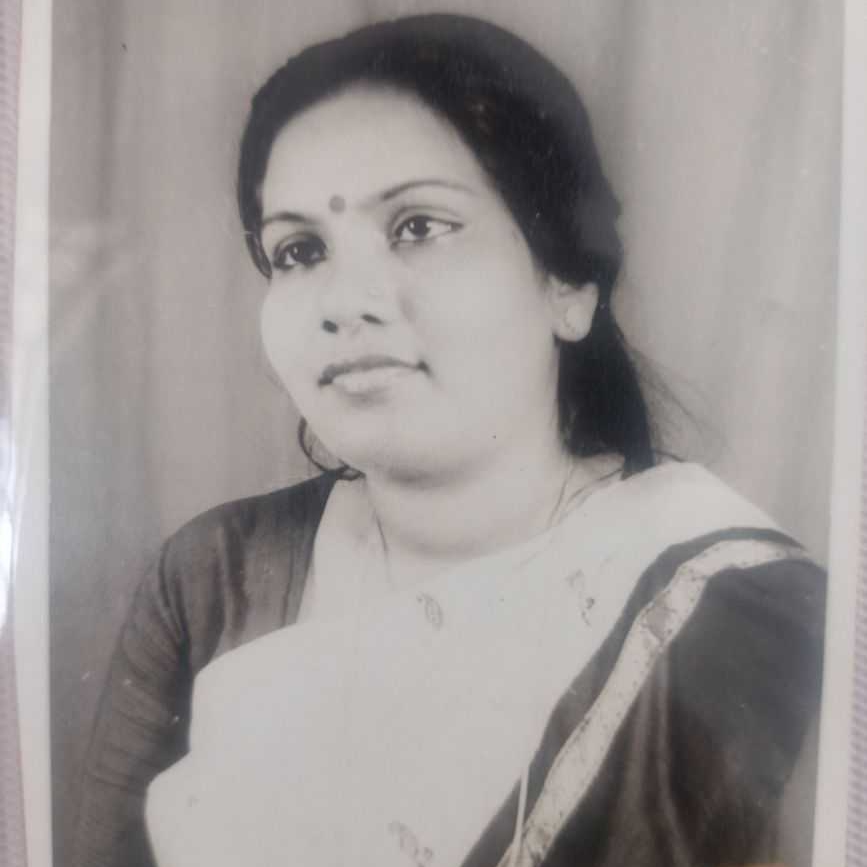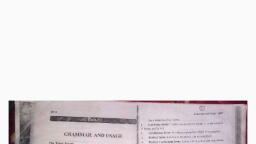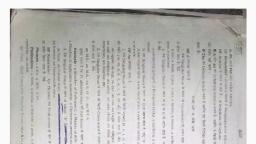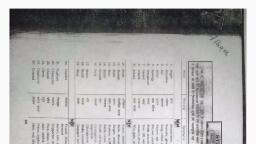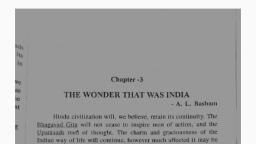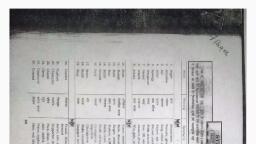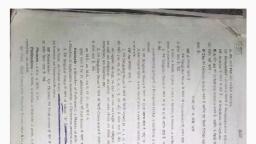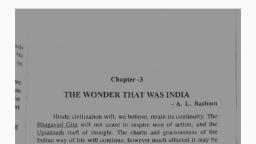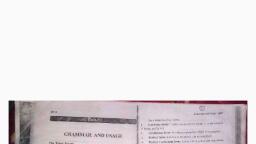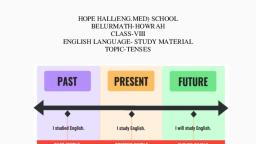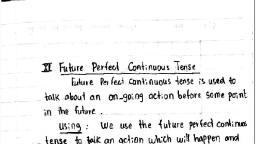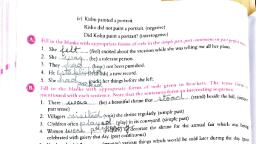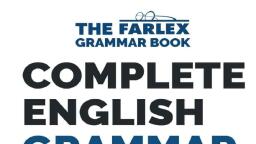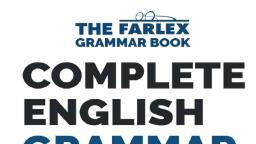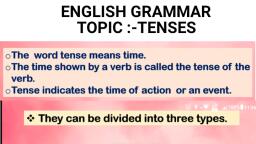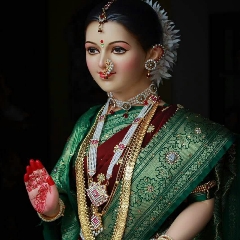Page 1 :
48 0, Grammar and Usage 49, Unit-5, Each tense has four forms:, Indefinite form: It refers to an action which is in the process, of being performed., Continuous form: It indicates an action which is in progress., 1., GRAMMAR AND USAGE, 2., 3., Perfect form: It refers to an action that is completed., Perfect Continuous form: It refers to an action that was started, sometime before and is still in progress., The Tense Forms, 4., Read the following sentences:, 1., The Present Indefinite Tense, Caste is vanishing., The tense expresses, 2., Ancient Indian culture has already perished., He finished his work yesterday., 1. Habitual actions:, 3., I get up early in the morning., 4., Hìndu civilization will retain its continuity., He walks to work., In the above sentences certain changes in the form of the verb, express the tiỉme of action or events., Sentence (1) is in present continuous tense (2) is in present perfect, (3) is in past indefinite and (4)is in future indefinite., 2. Universal truths/ facts of life:, The Sun rises in the East., There are twelve months in a year., 3., What is now taking place:, You must remember that the form of the verb in the context of, time, i.e. present, past and future is called Tense., Here comes Vinay! Look, how he runs!, 4., A future action: when futurity of an action is in the near future,, Present Tense : The verb that indicates an action or event, which takes place in the present time. For example :, (a), is clear from the context:, The college reopens on Ist July., He walks to work.e, Don't go until I allow you., He does not take care of his health., The Present continuous Tense, The tense expresses:, (b), Past Tense: The verb that indicates an action or event which, a habit that is often repeated (with adverb 'always'), Vikas is always working on that picture., My father is writing a book., an action that is in progress at the time of speaking., The children are playing in the garden., She is weeping now., took place in the time gone by. For example, He finished his work yesterday., 1., Neha wrote a letter to her husband last week., (c), Future Tense: The verb that indicates an action or event which, 2., will take place in the time to come by. For example:, I will help you., Tanuja will go to Dallas., 1
Page 2 :
50 O English Language and Indian Culture, Grammar and Usage as, (ii), How long you (wait) for me ?, She (watch) the TV all evening., I am meeting the Education Minister tomorrow., 4., Karan is coming to visit us next week.iter, A number of verbs are not normally used in this tense form, Mother (cook) all the morning but the meal is not yet ready., Rewrite the sentences given below using the verbs in the, Present Perfect or Present Perfect Continuous form, whichever is appropriate:, 6., (i), verbs of perception: see, hear, smell, verbs which express feelings / states of mind:, Want, desire, wish, refuse, forgive, care, hate, like, dislike., verbs involving the process of thinking:, The Present Perfect Continuous Tense, (ii), (i), She (learn) Russian for the last three years but she still (not learn), noaiaiobal, it well., We (live) in this small house for two years now. but we now, (decide) to move to a large house, 1., an action/event that began some time ago and is still going on:, I have been living in this house since 1996., Have you ever (read) Jane Austen's 'Pride and Prejudice"?, The volcano (create) havoc ever since it erupted.5v d, He (suffer) from fever for a week now but he (do) nothing about, 2., an action which was going on till a recent point of time and whose, result is still present:, She feels cold because she has been swimming for two hours., Exercises, it so far., She (take up) the new iob already., Fill in the blanks with the Present Indefinite or the present, continuous forms of the verbs provided in the brackets. Choose, the form for each verb according to the meaning of the sentence:, I., The Past Tense, The Past Indefinite Tense, The girls generally.. to their grandparent's house for the, holidays, but this year they... there. (go. not go) t, Children. .. to play cricket. (love) o ansqoen all, My nephew. .. here next week. He usually. his vacation here., (arrive. spend), 1., The tense is used to express habitual or regular actions in the, (i), past:, He never told a lie in his life., 2., 3., Every day he went for a swim: t nioan, an action in the past (which occurred during a period of time), a t stl, (1), sest zueuniine g, 4., 1... any thing during vacations. (not study), which has now ended:, 5., He generally.a bus to his office but today he..a scooter (take, He lived in Jabalpur for twenty years., ride), an event that happened at a particular time in the past usually, (1ii), 6., He rarely... a pen. but he ... one now. (use, use), used with an adyerb or adverb phrase: st, He left home for office at 9.30 yesterday. dina, Rewrite the sentences given below using the verbs in brackets, in the Present Perfect Continuous form:, I., The Sun rose at 6.50 yesterday., 1., He (live) in this town since 1964., The Past Continuous Tense, 2., She (Study) medicine for the last four years., The tense is used to express:, 2, anoth, The b, (m)
Page 3 :
52 O English Language and Indian Culture, an action in progress at a point of time in the past., Grammar and Usage a 53, At 10.00 p.m. I was watching a television serial., I go to work by car., I meet him on Monday., 1., (ii), an action in progress at some point of time in the past when, another action took place:, The bus was crossing the bridge when the bridge collapsed., 2., 3., She always wears a blue sari, (ii), two or more actions going on at the same time:, 4., He gets up at 6.30., While I was reading in the library, my friend was watching the, T. V., Raina speaks slowły., The play begins at 9.00., It smells good., 6., 7., In such sentences the conjunction while" is normally used. Some, adverbs which are commonly used with this tense are:, 8., I dream every night., always., continually, constantly, forever, Put the verbs in brackets into the past continuous tense., (ii), The Past Perfect Tense, 1., The children were frightened because it (get) dark., He usually walks to work but today I (see) him (travel) in, a bus., The tense is used to express, 2., (i), an action in the past (completed before another action, also in, the past:, 3., Are you going to Indore ?I thought you (go) to Bhopal., While they (watch) T. V. somebody entered the house from, the back., 4., By the time the doctor arrived the patient had died., (ii), an action or event that happened earlier, when looked at from a, point of time in the past:, At 9 o'clock the train had left., 5., He had a bad fall while he (repair) his house., From the sounds it was clear that Neha (practise) the, harmoniumoret rue, 6., (n), an action or event in the past which denotes causes for later, action in the past:, Just as I (wonder) what to do next, the call-bell rang, 8., My wife and 1 (talk) about you the other day., I did not know the man because I had not seen him before., (iii) Fill in the blanks with the past indefinite or the past perfect, forms of the verbs given in brackets to make the, sentences meaningful:, By the time the ambulance. the patient., The teacher. they could go home when they,. their, work. (say, complete), We.. the lesson after the teacher., The Past Perfect Continuous Tense, The tense is used to express an action or event that had begun, (arrive, die), and was going on upto a point of time in the past:, The telephone bell had been ringing for two minutes, but there, was nobody to attend to it., 2., it to us., Exercises, ांर्य, 3., (understand, explain), I wish you... your thesis by the due date. (submit), only a second, (i), Put the verbs in the sentences given below into the Past, 4., Indefinite tense:, Sandeep. . to get a first class. He, class and was naturally disappointed. (hope. get), 5., 3
Page 4 :
56 O, 54 English Language and Indian Culture, (ii, Grammar and Usage 55, 6., Several hours before the cricket match. . . the spectators., the stadium. (begin. fill), (determination), I will have a holiday tomorrow., (threat), 7., You shall be punished for this., He . . . hungry because he, previous day., nothing to eat since the, I will try to do better next time., (promise), (be. have), I will send you the required things. (willingness), The 'going to' form is used to express the speaker's intention to, perform a future action or an action that is expected to take place. For, example:, The Future Tense, English verbs do not have a special form for expressing future, time. Instead there are several ways of expressing it. The most important, of them are :, Will/Shall + Infinitive :, I am going to purchase a new scooter., The parcel will arrive tomorrow., He is going to fail if he wastes his time like this., Be going to + infinitive :, The Future Continuous Tense, The parcel is going to arrive tomorrow., The tense is used to express an action or event that is expected, Present, to take place in future in the natural course. For example:, Continuous:, A new batch of students will be arriving in July., The parcel is arriving tomorTOW., To express an action or event that ic expected to be in progress, nt a point of time in future. For example ue sts, When he reaches Patna, it shall be raining there., Šimple Present:, The parcel arrives tomorrow., Will/shall + Continuous Infinitive:, The Future Perfect Tense, The parcel will be arriving tomorrow., This tense form is used to express an action expected to be, For, The Future Indefinite, example:, To express simple future action shall' is used with the first, person and 'will' with all other words. For example:, I shall have finished writing this monograph by the end of next, month., I shall go now., You will sleep now., Exercises :, (i), Put the verbs in brackets into the 'be going, to' form:, They will leave tomorrow., 1., If you don't hurry you (miss) your train., It is incorrect though increasingly common to say 'I will' We, will' to express simple future action., 2., When you (pay) the electricity bill ?, 3., They (change) their old car., To express command, promise, threat and determination we use, *will' with the first person and 'shall' with the second and third persons., For example:, 4., Look at the sky. It (rain)., 5., The minister is standing up. He (makes) a speech., 6., He (grow) sugarcane next year., Thou shalt not steal., (command)
Page 5 :
56 U English Language and Indian Culture, Grammar and Usage 57, 7., The girl said, "I (be) a model when I grow up.", (ii), Put the verbs in brackets in the future indefinite:, This is our house., This house is ours., This is your house, This house is yours., 1., They (know) the result in a couple of days., This is their garden., This garden is theirs., 2., You (have) time to help me this weekend?, Mine, yours etc. can also be used as follows to mean 'one of, my', 'one of your' etc., 3., If the class four employees go on strike all office work, (stop)., He is a friend of mine. = He is one of my friends., 4., Unless he makes haste he (not catch) the train., He is a student of yours. = He is one of your students., 5., If he works well 1 (pay) him handsomely., She is a sister of hers. = She is one of her sisters., 6., I am sure you (like) your new job., This is a car of theirs. = This is one of their cars., Myself, yourself, himself, herself, itself, ourselves, yourselves and, oneself are used as objects when the subject, and object in the sentence, 7., If you learn English you (get) a better job., 8., If I drop this it (break)., are the same person. In other words when the action of the verb returns, 1o the doer, e.g.,, I harmed myself., 9., If you want more food you (have) to give me more money., 10., The Prime Minister (present) the awards., The Future Perfect Continuous Tense :, He spoke to himself., It expresses a probable completion of action (now past) in the, future:, She did it for herself., Til in the blanks with possessives or 'self' forms:, I cut... with the razor this morning., 1., Rita will have been waiting for the train at the station for, 1., three hours., 2., Their friends soon went away and they were left to., 2., Ramesh will not have been practising for the Test Match, throughout the day., Did both of you enjoy... on, trip to Kashmir?, 3., 4., She wrote the letter and enclosed an envelopé addressed, Possessives, to..., This is, my, book as well as -This book is mine., 5., I saw a friend of. . . speaking to. .. in the street this, But we cannot say This is mine book or This book is my., morning. Can you tell me who he was?, Note the corresponding possessive forms given below:, 6. Father asked me to stay with a friend of.in Delhi., Will you convey... greetings to all friends of, happen to meet in Raipur ?, I have bought it for... and for no one else., This is my book., This book is mine., you, ...., 7., This is your shirt., This shirt is yours., This is his pen., This pen is his., 8., This is her frock., This frock is hers., 9., Have we to do it all by ... ?, 10., He has made. .. very unpopular in ... office., This is its handle., This handle is its.
